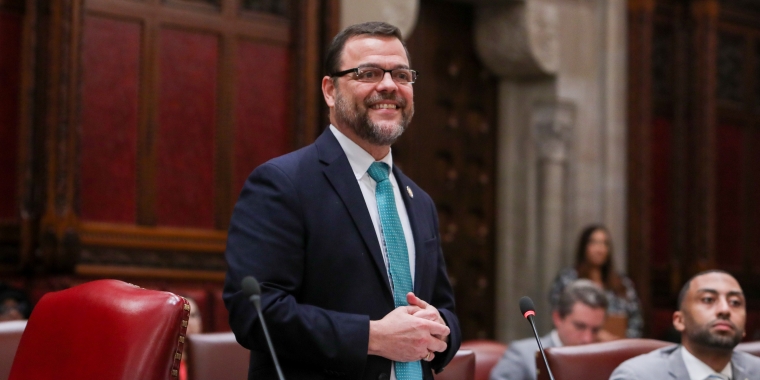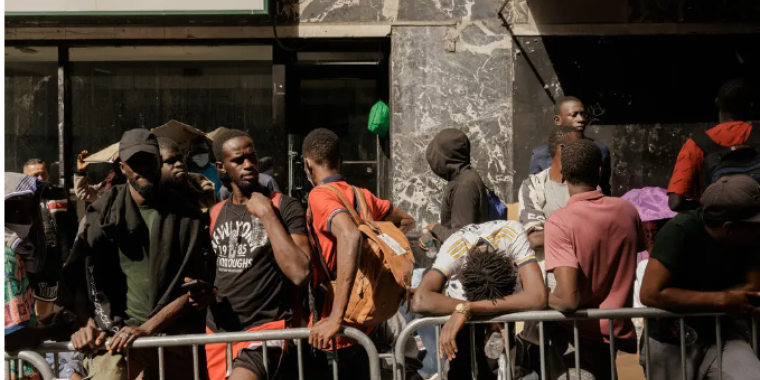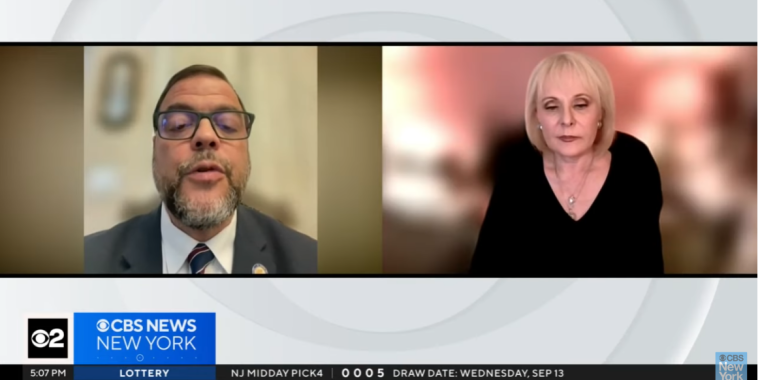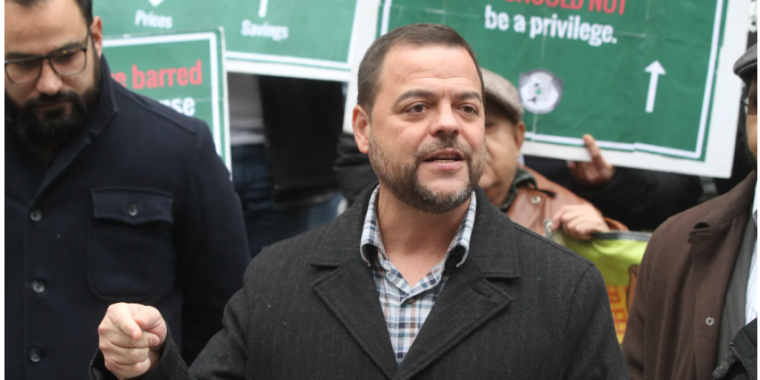
NYS Senator Luis Sepúlveda and the Senate Majority Take Action to Address SCOTUS Rulings Invalidating New York’s Concealed Carry Law and Overturning Roe v. Wade
July 1, 2022
Today, I joined my colleagues in the NYS Senate Majority to take assertive action to protect New Yorkers by passing legislation that enhances licensing requirements for concealed carry permit applicants, adds new provisions for sensitive areas where the permit holder is prohibited from carrying a concealed firearm, enhances safe storage requirements to apply if a minor under the age of 18 lives in the home, makes technical changes to the Body Armor Law, and establishes New York as a “point of contact” state. The NYS Senate Majority also celebrated the first passage of an amendment to codify the right to an abortion and the right to contraception in the State Constitution. This amendment would also update the existing Equal Rights Amendment to extend current protections to several new classes, including on the basis of sex, disability, national origin, ethnicity, and age.
NYS Senator Sepúlveda said: “I am proud to be a member of a conference that acts swiftly to uphold the rights of New Yorkers. It was critical we moved rapidly to protect New Yorkers and keep more guns off of our streets. The statute passed today is not only consistent with the allowable restrictions outlined in New York Rifle & Pistol Assoc., Inc. v. Bruen, but it also ensures that New Yorkers are protected from gun violence by enumerating a list of sensitive locations where even people with licenses cannot carry a firearm including our subways. Additionally, after last week’s reversal of Roe v. Wade, we also made it clear that New York State must continue to stand up and be a national leader to protect women and individual rights. We cannot allow women to become second class citizens by a Supreme Court decree. That is why we are proactively codifying broader equal rights under the law and ensuring the constitutional right to abortion and contraception in New York. This is a massive step forward for New York. While other states move backwards, and seek to live in the past, we are taking an affirmative stance against the Supreme Court’s attack on our rights. I look forward to passing this again next year so it can be placed before voters in November 2023. I am also incredibly proud of our Democratic leadership for advancing these historic changes and thank Majority Leader Andrea Stewart-Cousins, Speaker Heastie, and Governor Hochul for their partnership in getting this done.”
The legislation advanced by the Senate Majority on guns, includes:
Concealed-Carry Permitting Process
● Adds a definition of “good moral character”:
○ Good moral character as defined in this legislation means having the essential character, temperament, and judgment necessary to be entrusted with a weapon and to use it in a manner that does not endanger oneself or others.
○ Defining “good moral character” more specifically in this way will make sure that licensing officers will create processes that assess an individual’s trustworthiness to handle a firearm.
● This proposal would require concealed-carry applicants to meet in person with a licensing officer for an in-person interview. Under this legislation, it would be required for an applicant to submit the following information:
○ Names and contact information for the applicant’s current spouse or domestic partner, and current cohabitants, and an indication if any minors live with the applicant;
○ Names and contact information of at least four character references;
○ Certification that the applicant has completed all of the required training;
○ A list of social media accounts from the past three years to confirm that applicant’s character and conduct; and
○ Anything else the licensing officer requests that is reasonably required to complete their review and assess good moral character.
● Furthermore, in addition to the disqualifying felonies in current law, concealed-carry applicants must also not have been convicted of assault in the third degree, misdemeanor driving while impaired, or menacing within the previous five years
Sensitive Places and Trespass
● Criminal possession of a weapon in a prohibited area will be a Class E felony punishable by up to four years in prison. In addition, there will be a separate Class E felony for criminal possession of a weapon in private property where the owner has not explicitly authorized weapons on the premises.
● Carrying a concealed weapon will be prohibited in the following areas:
○ Federal, state, or local government buildings, including courts;
○ Places providing health or medical care, such as hospitals, nursing homes, adult care facilities, domestic violence shelters, medical campuses, behavioral facilities, mental health and chemical dependency facilities, and clinics;
○ Places of worship or religious observation;
○ Places where children gather, including but not limited to, schools, libraries, daycare centers, playgrounds, parks, and zoos;
○ Any OCFS regulated locations that provide services to children youth or young adults
○ Any OPWDD, OASAS, OMH, and OTDA funded or regulated locations, including homeless shelters;
○ Places used for public transportation or transit including, airports, train stations, subway and rail stations, and bus terminals;
○ Establishments where alcohol or cannabis is consumed;
○ Locations when being used as a polling place;
○ Educational institutions including, colleges, universities, and private schools;
○ Theaters, stadiums, arenas, racetracks, museums, amusement parks, performance venues, concerts, exhibits, conference centers, banquet halls, casinos, and venues for athletic games or contests;
○ Any public sidewalk restricted from access for a permitted special event that has signage
○ Any gathering of individuals who are collectively expressing First Amendment rights of protest or assembly.
○ Times Square
● The prohibition of carrying weapons in sensitive areas does not apply to police officers, peace officers, armed security guards, active duty military personnel, or any person who is lawfully engaged in hunting.
○ The bill also ensures residents of childcare facilities (such as foster parents) and other similar locations can keep a firearm in the home as long as it is stored safely and in accordance with all applicable regulations.
Safe Storage
● Expands existing safe storage laws, which were originally enacted in 2019. Current law requires guns to be safely stored in the home if a person under the age of 16 lives in the home or if a person legally disqualified from possession of a gun lives in the home. This bill would raise the age limit, so that safe storage laws would apply if a minor under the age of 18 lives in the home.
● Implements a vehicle safe storage requirement so that a person cannot leave a gun in a car outside of his or her immediate possession or control, unless the gun is in a lockbox.
Body Armor
● The legislation amends the definition of body vest to “armor,” which means any product that is a personal protective body covering intended to protect against gunfire, regardless of whether the product is to be worn alone or is sold as a complement to another product or garment. The terms ‘vest’ and ‘armor’ have been used interchangeably in casual parlance, but they do not mean the same thing. This legislation amends this definition so as to avoid misinterpretation.
● The legislation also prohibits the unlawful sale and purchase of body armor if the individual or entity does not engage in an ‘eligible profession’ which includes police officers, peace officers, those employed in military services and other similar professions.
Point of Contact
● Establish New York as a “point of contact” state by requiring gun dealers to contact the State Police to conduct the background check that must be done before an individual can purchase a gun. In 2017 alone, NCIS stopped 181,000 prohibited people from attempting to buy guns, so implementing this bill would decrease the number of those who are unfit from purchasing a gun in New York.
Ammunition Database
● Makes technical changes to the existing law that establishes an ammunition database to verify ammunition sales in New York, enacted as part of the SAFE Act in 2013, and strikes the memorandum of understanding between the previous Executive and Republican Majority Leader stalling its implementation.
● Any seller of ammunition or dealer of firearms shall keep either an electronic record, or dataset, or an organized collection of structured information, or data, typically store electronically in a computer system approved as to form by the Superintendent of the State Police.
○ In the record shall be entered at the time of every transaction involving ammunition the date, name, age, occupation and residence of any person from whom ammunition is receiving or to whom ammunition is delivered, and the amount, caliber, manufacturer’s name and serial number, or if non, any other distinguishing number of identification mark on such ammunition.
The Equal Rights Amendment advanced by the Senate Majority, includes:
Expanding Protected Classes Under the Equal Rights Amendment:
- Ethnicity, national origin, age, disability and sex. Sex includes sexual orientation, gender identity, gender expression, pregnancy, pregnancy outcomes, reproductive healthcare and autonomy.
- With these enumerations, this amendment guarantees a constitutional right to reproductive healthcare for any individual in the state of New York. It also protects marriage equality and other rights that the Supreme Court has endangered.
- Additionally, this amendment preserves laws designed to prevent or dismantle discrimination on the basis of these characteristics such as affirmative action.
related legislation
Share this Article or Press Release
Newsroom
Go to Newsroom
New York Considers State Work Permits for Migrants as Influx Worsens
September 16, 2023

New York considering issuing its own work permits to asylum seekers
September 13, 2023

